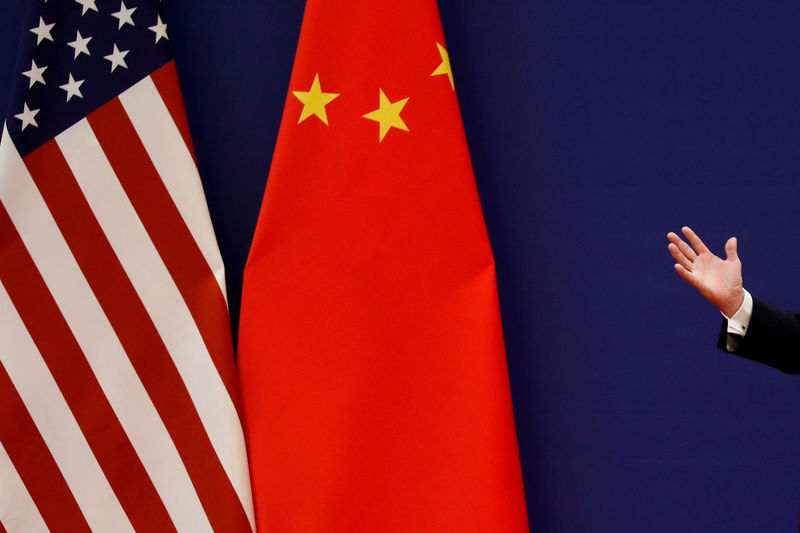By Hideyuki Sano
TOKYO (Reuters) - Asian shares came under renewed pressure on Friday as a report U.S. President Donald Trump was preparing to step up a trade war with Beijing sent Chinese stocks lower and partially erased gains made in this week's global rally.
Many emerging market currencies were also frail after Argentina's peso sank on Thursday despite the central bank's interest rate hike.
European shares are expected to open lower, with major European stock index futures (STXEc1) (FFIc1) (FCEc1) (FDXc1) falling 0.2 percent in early trade.
MSCI's broadest index of Asia-Pacific shares outside Japan (MIAPJ0000PUS) dropped 0.7 percent, for monthly drop of 1.5 percent.
The index has underperformed MSCI ACWI (MIWD00000PUS), a gauge of the world's 47 markets, for four months in a row as Sino-U.S. trade worries hit Chinese shares.
(Graphic: Asian shares vs world shares - https://reut.rs/2LMCHpu)
The Shanghai composite index (SSEC) had fallen to near a 2-year low hit earlier in the month but recovered some of the day's losses later in the session.
"China's stock market has priced in a very bad situation as if the Chinese economy was going into a hard landing, which I don't think will be the case," said Chi Lo, an economist at BNP Paribas (PA:BNPP) Asset Management.
While trade jitters dominated market sentiment, indicators suggests activity in the world's second largest economy remained firm.
The official Purchasing Managers' Index (PMI) on Friday showed growth in China's manufacturing sector unexpectedly picked up in August after a two-month slide.
Still, investors remained cautious as they expect more risks from the trade frictions down the road.
Japan's Nikkei <.N225> closed down 0.02 percent.
U.S. S&P500 e-mini futures (ESc1) were slightly weaker a day after the S&P 500 (SPX) lost 0.44 percent from Wednesday's record close of 2,914.
Pouring cold water on a rally in global shares that started in the middle of the month were hostile comments from Trump on trade.
Bloomberg reported that Trump said he was ready to impose more tariffs on $200 billion worth of goods from China as soon as the public comment period on the plan ends next week.
"So far, Trump has carried out what he said he would do," said Ayako Sera, market economist at Sumitomo Mitsui Trust Bank. "Even though there are some doubts the U.S. trade representative could come up with new tariffs so quickly, I suspect worries about a trade war will start to eclipse optimism based on strong U.S. economic data."
Trump also threatened in an interview with Bloomberg on Thursday to withdraw from the World Trade Organization if "they don't shape up" -- a move that would further undermine one of the foundations of the modern global trading system.
In addition, he said the European Union's proposal to eliminate auto tariffs is not good enough and called its trade policies "almost as bad as China."
Those remarks hosed down any positive sentiment following negotiations over the North American Free Trade Agreement (NAFTA).
The cautious mood helped lift the yen, which rose 0.6 percent on Thursday, its biggest daily rise in about six weeks. In Asian Friday trade, it stood flat at 110.98 per dollar
The euro was little changed at $1.1665 (EUR=), having shed 0.33 percent in the previous session.
The common currency has recovered from a 13-1/2-month low of $1.1301 hit in mid-August but looks set to end the month little changed from end-July.
Emerging market currencies had less luck, with currencies relying on foreign capital to finance their current account deficit hit the hardest.
The peso
Argentina's central bank at an emergency meeting on Thursday voted unanimously to raise its benchmark rate to 60 percent from 45 percent, however, the unexpected move failed to stabilise the peso.
That knocked the Brazilian real
The Turkish lira, which has been hit by concerns over President Tayyip Erdogan's interference in monetary policy and his diplomatic spats with Washington, also slipped towards record low marked about two weeks ago.
The lira
In Asia, the Indonesian rupiah
The Indian rupee
Oil prices steadied after hitting their highest levels in more than a month the previous day on growing evidence of disruptions to crude supply from Iran and Venezuela and after a fall in U.S. inventories.

Brent crude oil (LCOc1) traded almost flat at $77.70 a barrel while U.S. crude (CLc1) stood at $70.26 a barrel, little changed from previous close.